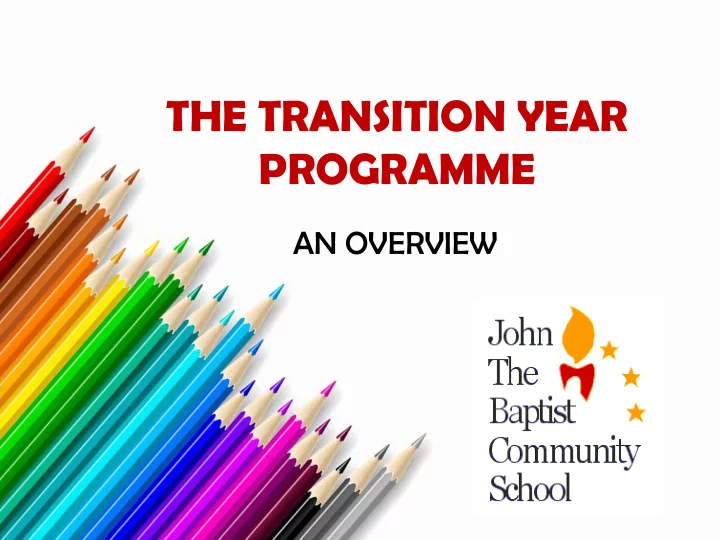

THE TRANSITION YEAR PROGRAMME AN OVERVIEW
TRANSITION YEAR Transition Year is a one year school based programme between Junior and Senior Cycle . It is designed to act as a bridge between the two by facilitating the smooth transition from the more dependant learning of the Junior Cycle to the more independent self-directed learning required for the Senior Cycle
AIMS Education for MATURITY with emphasis on social awareness & increased social competence Promotion of Education general, through technical and experience of academic ADULT & SKILLS with an WORKING LIFE emphasis on as a basis for interdisciplinary personal and self-directed development & learning maturity
BENEFITS • Enable students to take a greater responsibility for their own learning and decision making. • Enable students to develop basic competencies in key areas according to their individual needs. • Help students to develop a range of transferable critical thinking and creative problem solving skills. • Prepare students for the world of work. • Development of self-confidence
TY IS SCHOOL BASED • STUDENT FOCUSED • TEACHERS’ EXPERTISE IS USED • INDIVIDUAL SYLLABII WRITTEN • VARIED TEACHING & LEARNING • VARIED ASSESSMENT • SCHOOL-BASED CERTIFICATION • DEPARTMENT SUPPORT/ CERTIFICATION • INSPECTORATE MONITOR
PEELING THE LAYERS OF A TY PROGRAMME • 1. CALENDAR LAYER • 2.TRANSITION SPECIFIC LAYER • 3. SUBJECT SAMPLING LAYER • 4. ‘CORE’ SUBJECT LAYER
ASSESSMENT ‘Assessment should be an integral part of the learning process in Transition Year not separate from it’ ( D.E.S.Guidelines) • Portfolio assessment • Oral /Aural assessment • Project work • Self-assessment • Peer-assessment • Written /Practical Class test • Skills assessment.
The Importance of Reflection • To really gain an understanding of events and truly learn from them, reflection is key.
The Reflective Diary • A personal diary charting your personal journey through the year. Remember the journal is a reflection of your efforts and personal development throughout the year. Therefore you must think carefully about what they include and omit. • However, there are some requirements...
Requirements • One full page reflection on week’s activities • One entry on a specific activity from that week (paragraph on a chosen activity from the week – when, where, reaction to it etc.) • Cover • Reports on certain activities such as guest speakers, trips etc. • All through the year, you will be given specific tasks, normally on some aspect of reflection or decoration to work on
EVALUATION ENCOURAGED AS A REGULAR FEATURE External – • INSPECTORATE / Dept. of Ed.& Science Internal – • SCHOOL – WHOLE STAFF • INDIVIDUAL SUBJECT TEACHER • STUDENTS • PARENTS • WORK PROVIDERS
The Programme
Trips
Lots of Activities
Some considerations • Attitude • Time • Cost • Extra-curricular activities • Self directed learning • Behaviour
Entry into Transition Year Very popular Limited number of places Out of 100 marks: • Contribution to School Life 25 marks • Work Ethic 25 marks • Behaviour 25 marks • Interview 25 marks
Recommend
More recommend